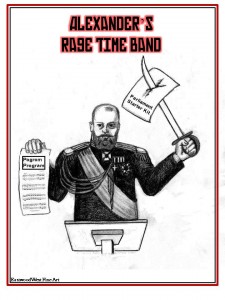Alexander’s Rage Time Band
Posted in General, On This Day on March 13th, 2009 by Eugene Finerman – 3 Comments March 13, 1881 was a terrible day for Russia but a great day for show biz. Neither was the intention of a group of radical students in St. Petersburg; these young revolutionaries simply expected to transform Russia into an instant democratic utopia by killing Tsar Alexander II. Ironically, Alexander was the most progressive Tsar since Peter the Great (although Catherine the Great proclaimed her liberalism…but only in French, which the serfs did not understand). Alexander had liberated the serfs in Russia in 1861, perhaps setting an example for Abraham Lincoln. The Liberator Tsar also established community councils for local self-government, and he granted autonomy to the Finns–who evidently were more likable than the Poles. In fact, the Tsar had commissioned plans to establish a parliament in Russia; he only had to sign the final authorization but that could wait until Monday. March 13th was a Sunday and the Tsar had his weekend routine. That included a carriage ride.
March 13, 1881 was a terrible day for Russia but a great day for show biz. Neither was the intention of a group of radical students in St. Petersburg; these young revolutionaries simply expected to transform Russia into an instant democratic utopia by killing Tsar Alexander II. Ironically, Alexander was the most progressive Tsar since Peter the Great (although Catherine the Great proclaimed her liberalism…but only in French, which the serfs did not understand). Alexander had liberated the serfs in Russia in 1861, perhaps setting an example for Abraham Lincoln. The Liberator Tsar also established community councils for local self-government, and he granted autonomy to the Finns–who evidently were more likable than the Poles. In fact, the Tsar had commissioned plans to establish a parliament in Russia; he only had to sign the final authorization but that could wait until Monday. March 13th was a Sunday and the Tsar had his weekend routine. That included a carriage ride.
The conspirators knew the route and were waiting with bombs. The first bomb killed a guard and wounded the carriage driver and bystanders, but the Tsar remained safe. Stepping out of the carriage and its bullet-proof exterior, the Tsar wanted to console the casualties. He became one himself. The second bomb landed at his feet–and removed them. Carried back to his carriage, the Tsar was rushed back to the palace where he bled to death in the sight of his son, the Tsarevich, as well his grandson Nicholas.
The death of Alexander II did not topple the monarchy, but it definitely killed any progressive tendencies in the government. ( You can also imagine the life expectancy of the captured conspirators. ) The new Tsar Alexander III had never agreed with his father’s liberal ideas, and now he felt vindicated in his reactionary views. The radicals had murdered his father, so Alexander III was determined to suppress any and all challenges to his autocratic authority. Although he could not reestablish serfdom (that would have been too awkward), he managed to undo many of his father’s reforms. The local community councils were abolished, and you can imagine his reaction to the idea of a parliament. He personally shredded the authorization plans. Alexander’s idea of reform was any program that would make his tyranny more effective. A sadist in need of an outlet now had a promising future in the Tsarist secret police. Of course, the suppression created as many radicals as it executed, and the Siberian prison camps became finishing schools for revolutionaries. However Alexander III did not live to see the consequences; his kidneys failed before his policies did. His ineffectual but equally narrow-minded son Nicholas would pay the reckoning. The last Romanov brought upon the very Revolution that he hoped to crush; but at least Alexander III might have admired the tyranny of the Communists.
But how was the murder of Alexander II a great day for show biz? The new Tsar had a hobby: Anti-Semitism. The Jews were his favorite phobia, and he made his hatred the government policy. He initiated a series of Anti-Semitic laws that the Spanish Inquisition might have envied. The Jews were restricted to what they could do, and where they could live. They certainly were not welcome in St. Petersburg and Moscow; the expulsion order made that clear. Russia’s Jews were confined to Ukraine, Poland and Lithuania. Of course, there were exceptions. Even Anti-Semites like music. So a violin prodigy would be allowed to study in St. Petersburg, but his parents could not visit him there. Jews did have the distinction of being the official scapegoat for any and everything that went wrong in Russia. Every Jew evidently was both a Rothschild and a Communist. Of course, if any mob felt like attacking Jews, the Tsar cheerfully conferred that uncivil liberty.
Tsar Alexander III did grant the Jews one right: emigration, and the sooner the better. The restrictive laws and the pogroms were the Tsar’s idea of a bon voyage party. Two millon Russian Jews took the hint, moving to a land where the Irish cops were more humane than the Cossacks. And although America did not offer imperial scholarships to the talented, it still provided opportunities. But for Alexander III, Hollywood might yet be an orange grove.